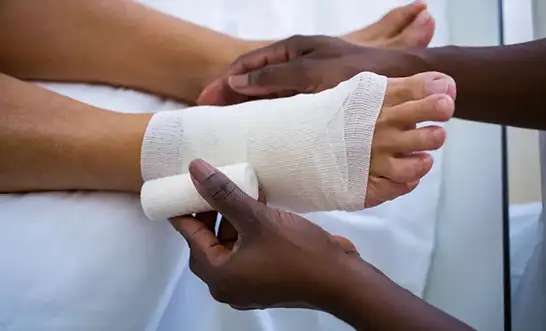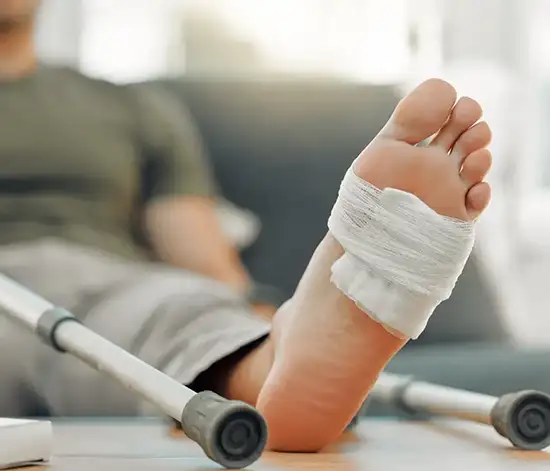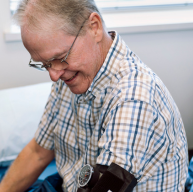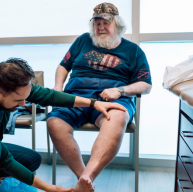Healing Wound Care for Diabetes, Foot Ulcers and More
Healing Wound Care for Diabetes, Foot Ulcers and More

- Advanced Treatment Options
- Patient-Centric Approach
- Comprehensive Care Network
Expert Foot Wound Care for Faster Healing

Expert Foot Wound Care for Faster Healing
Are you struggling with foot ulcers or sores on your feet that won’t heal? Non-healing wounds require specialized care to promote healing and prevent complications from underlying conditions like diabetes. At StrideCare, our foot wound care program is designed to address stubborn wounds, including diabetic foot ulcers, pressure ulcers, and other ulcerated sores on the feet.
We understand the toll non-healing wounds can take on your day-to-day life, and we’re here to provide a pathway to effective recovery, from the initial assessment to ongoing wound care management. Find a location near you to get started today.
Our Approach to Effective Foot Wound Care for Healing
At StrideCare, we know every wound and every patient is unique. Our foot wound care treatments are designed to provide a comprehensive approach that addresses both your wound itself and any underlying conditions that may be affecting your healing. Our treatments for foot wounds include:
- Personalized evaluation
- Debridement
- Advanced wound dressings
- Compression therapy
- Antibiotic therapy
Our goal is to help each patient achieve the best possible healing outcomes while minimizing the risk of recurrence. We’re committed to guiding you through each phase of your treatment journey with expertise, compassion, and a focus on restoring your mobility and quality of life.
Here’s What Patients Are Saying About Our Care



4.89 Average Online Review Score



Common Causes of Non-Healing Foot Wounds
Non-healing wounds on the feet often result from underlying health issues that slow the natural healing process. For many patients, conditions such as diabetes and poor circulation create ideal conditions for foot ulcers and other sores to develop. Diabetes, in particular, can reduce sensation in the feet, making it harder to detect small cuts or injuries until they become problematic.
Other causes may include venous insufficiency, which leads to fluid buildup and swelling in the legs and feet, making the skin more vulnerable to ulcers. Swollen legs, previous injuries, and pressure from ill-fitting shoes are also factors that contribute to ulcerated sores on the feet. With our wound care treatments at StrideCare, the complications from these conditions can be managed effectively to help you heal quickly and safely.
When to Seek Foot Wound Care Services at StrideCare
Understanding when to seek foot wound care can make all the difference in your healing process. You may benefit from StrideCare’s wound care services if you experience any of the following symptoms or conditions:
- Wounds that haven’t started healing within two weeks or fully healed in six weeks
- Pain, swelling, or redness around a wound
- Ulcers on the feet due to diabetes or venous issues
- Signs of infection, such as fever, warmth around the wound, or discharge
If you have been dealing with a non-healing wound, don’t wait—our podiatry wound experts are ready to help. Seeking timely, specialized treatment may prevent further complications and improve healing outcomes.
Get Effective Foot Wound Care Near You
Are you ready to take the next step toward relief from non-healing foot wounds?
Enter your zip code below to find a StrideCare podiatry expert near you and get started today.
Frequently Asked Questions about Foot Wound Care
What types of wounds do you treat?
We treat various types of non-healing wounds, including diabetic foot ulcers, pressure ulcers, surgical wounds, and venous ulcers on feet. Our podiatrists are experienced in helping patients manage wounds that don’t heal naturally.
How long before my wound needs professional care?
Can wound care prevent future ulcers?
Yes, in addition to treating current wounds, we provide education on preventive foot care, especially for patients with diabetes. Regular visits and daily foot care can significantly reduce the risk of future ulcers and other complications.
Is wound care for foot ulcers painful?
Our team prioritizes patient comfort and uses the most gentle methods available. While certain treatments may cause mild discomfort, we work to minimize pain and make each visit as comfortable as possible.


